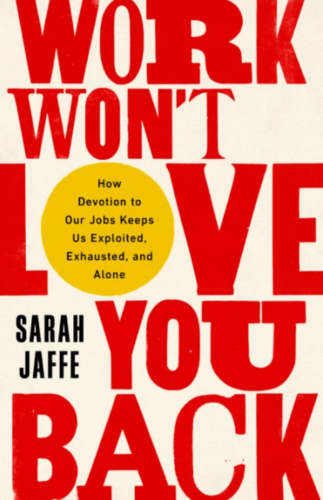Many readers know I like to set a common theme for the year. For this year’s theme, I chose value and the corporate workplace, a topic I’ve also written about in prior years. So far, I’ve hit this theme in a number of ways. But one way I might summarize it all? Work won’t love you back.
Imagine my surprise, then, when I found out labor journalist Sarah Jaffe recently wrote a book called Work Won’t Love You Back.
Let’s take a look at Jaffe’s book.
Gender, Exploitation, and the Workplace
As a main theme, Jaffe moves from gender history to family relationships to the modern workplace and then back again. She tells the story of how feminists advocated for women to enter the workplace, and then how they got something much different than they bargained for. While they fought for self-fulfillment, they too often received low wages and disrespect.
Jaffe’s right about all this, of course. And as a labor journalist, she’s well positioned to tell this story.
Jaffe then profiles a number of jobs. She begins with domestic workers and teachers, and then she moves from nonprofit orgs to everything from art to academia to sports. Along the way, she focuses on particular sorts of cases. Mainly, she looks at how companies marginalize women and non-white people to accomplish their goal of suppressing wages and working conditions for everyone in a particular line of work.
Work Won’t Love You Back – You Know…
Jaffe finishes each profile by turning toward the positive. She profiles how workers become aware of the system and start organizing unions. Workers figure out they have collective interests and can work toward those interests by working collectively. Many leftists, of course, know this. They’ve seen recent job actions by teachers, nurses, and other groups.
Jaffe performs the valuable service, though, of putting these work actions in front of a larger audience.
…Or You Don’t Know?
But when I saw the title of Jaffe’s book – Work Won’t Love You Back – I had something else in mind. I expected to find profiles of white-collar workers, especially corporate workers. Admittedly, Jaffe doesn’t totally ignore this end of things. She writes about interns, many of whom work in the corporate office. She also includes academia and the nonprofit world, areas of the workplace with white-collar components.
However, even in those realms, Jaffe keeps her focus on the pink-collar and, to a lesser extent, blue-collar worlds. There’s nothing wrong with this. Jaffe is a labor journalist, and these worlds are what she studies. Plus, she finds enough to build a great narrative: the world foists onto women the belief they should be paid in love and feelings rather than in cash or job power.
But ‘work won’t love you back’ brings to mind for me the white-collar office worker who buys into these various myths. Increasingly, teachers and nurses see themselves as exploited and are organizing to fight it. By contrast, many corporate office workers really do live to work, put work at the center of their lives, and don’t see the problem. They work 60+ hour weeks on the corporate mission. And even when they earn high salaries, their employers leave them without a social life or deep sense of purpose.
In other words, in particular areas of the corporate world – especially nonprofit leadership, middle management, and the more secure parts of academia (i.e., administration or tenured faculty) – we find something very much like ‘false consciousness.’
This latter problem still seems to need its own book.
